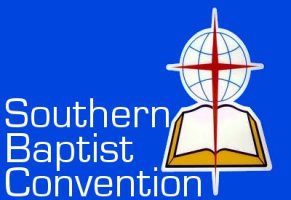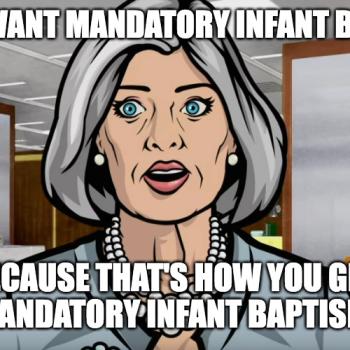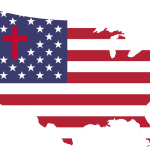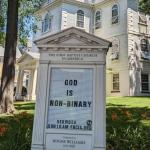Russell Moore is a biblical “inerrantist” — a protégé of fundamentalist enforcer and young-Earth creationist Al Mohler, and both a product and a proponent of the fundie revolution at Southern Seminary. He’s emphatically anti-gay-marriage and anti-abortion — so much so that he regularly earns the commendation of the adjective “staunch” to describe his opposition to both of those (a badge of honor in conservative circles).
My disagreement with all of that is, I hope, very clear, but here I’m simply describing, not criticizing. Point is the guy is very conservative politically and culturally, and his theology and his approach to the Bible are of precisely the modern American Protestant variety that modern American Protestants refer to as “conservative.”
 But Russell Moore is now, alas, “controversial” — a designation usually reserved in evangelical circles for squishy hippies like Jim Wallis and Brian McLaren. As Jonathan Merritt reports for Religion News Service, Moore is now being criticized for tugging the Southern Baptist Convention in a frighteningly liberal direction. “Does Russell Moore really represent Southern Baptists?” the headline to Merritt’s report asks.
But Russell Moore is now, alas, “controversial” — a designation usually reserved in evangelical circles for squishy hippies like Jim Wallis and Brian McLaren. As Jonathan Merritt reports for Religion News Service, Moore is now being criticized for tugging the Southern Baptist Convention in a frighteningly liberal direction. “Does Russell Moore really represent Southern Baptists?” the headline to Merritt’s report asks.
That question is asked, pointedly, by several Southern Baptist pastors cited in Merritt’s article. They’re worried about Moore serving as the replacement for Richard Land, his predecessor as head of the SBC’s Ethics and Religious Liberty Commission, and thus as the denomination’s* de facto public spokesman. Land, these pastors suggest, unquestionably did really represent Southern Baptists. But Moore, they fear, does not.
The problem, to be blunt, is that Richard Land was a big old honkin’ racist. And Moore is trying not to be that. “As president of the ERLC,” Merrit writes, Moore “has refused to budge on cornerstone conservative positions such as opposition to gay marriage and abortion, but …”
But what? It’s not like Moore is going around telling people that the Earth is 4.5 billion years old. Aren’t those “cornerstone conservative positions” sufficient? Well, not for many Southern Baptists, apparently. For them, those are necessary, but not sufficient markers of Southern Baptist identity. And Moore, it seems, is failing the test of the other key ingredient:
But Moore has also taken surprising positions on other issues, even placing himself at odds with some of his fellow conservatives. To wit:
• In 2013, when some hard-line conservatives called for building a wall on the U.S.-Mexico border, Moore endorsed and allowed the ERLC to remain attached to the “Evangelical Immigration Table.” The group launched a $250,000 ad campaign to advocate for immigration reform that “establishes a path toward legal status and/or citizenship.” …
• In the 2015 debate over whether the confederate battle flag should be removed from the grounds of the South Carolina Capitol, conservatives in the South were conflicted. Moore was not: “Let’s take down that flag,” he wrote. …
• When many conservatives called for a boycott of all Syrian refugees to the U.S., Moore signed a letter asking Congress to “reject damaging changes to the U.S. refugee resettlement system that would cause the life-saving program to grind to a halt.”
• Most recently, Moore has opposed Donald Trump’s bid for president. Moore did so in the opinion pages of The New York Times and on social media, among other places.
The problem, apparently, is that Moore may be a staunch opponent of abortion and staunch defender of “traditional marriage” and a staunch defender of biblical inerrancy, but he clearly does not want to be a staunch defender of white supremacy.
And that apparently makes a lot of white Southern Baptists very uncomfortable. To them, if Moore is not willing to defend white supremacy, then he isn’t really representative of Southern Baptists.
Merritt knows the Southern Baptist world well, and he insists we shouldn’t overstate the level of criticism and pushback Moore is facing. He writes:
I’ve been around Southern Baptists long enough to know controversy when I see it. This is not one. … Don’t confuse the gripes of crazy Uncle Carl with a family feud.
Fair enough. But what he writes next undermines that attempt to dismiss these critics:
Some old-school Baptists might not like Moore’s sophisticated approach because it sometimes sounds conciliatory to more liberal causes.
There it is. Conservative vs. liberal. For Merritt and Moore and all Southern Baptists, that framework is inescapable. And the implications of it are inescapable. “Conservative” means legitimate. “Liberal” means illegitimate. To be more conservative — politically, theologically, culturally — is to be more legitimately Southern Baptist. And to be more liberal in any of those ways is to stray from Southern Baptist orthodoxy, legitimacy and identity.
The problem for Moore is that white supremacy reads “conservative.” It is a conservative signifier and questioning it or refusing to defend it — staunchly — “sounds conciliatory to more liberal causes.” This is how Southern Baptists hear all talk of racism and how even good religion reporters inevitably write about it. That makes white supremacy something conservatives must conserve, lest their legitimacy and their identity be dissipated by the ever-present threat of liberalism.
– – – – – – – – – – – –
* In Baptist parlance, “denomination” is a pejorative accusation. Here I am criticizing, but I’m also describing — accurately, I think. If anyone really believes the SBC remains a loose association of Baptist congregations rather than a denomination, just watch what happens when one of those congregations calls a woman to be its pastor and watch how the denomination responds.
















